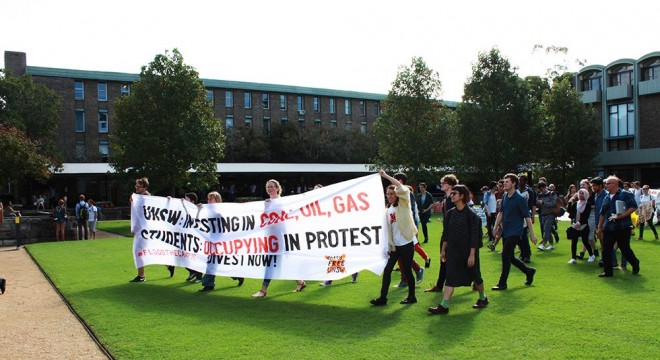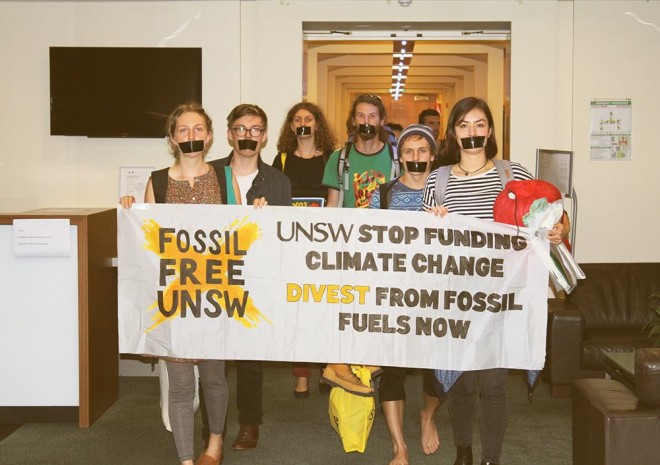Australia’s Response To Climate Change Is Cooked, But All Of Us Can Still Take Action
"When it’s 2040 and we’re all getting cooked, what are you gonna tell your kids that you did?"

It is clearer than ever that the ‘adults’ are not going to stop this planet burning.
With the latest support the Queensland and federal governments have thrown behind Adani’s Carmichael coal mine, it looks increasingly likely that this mega-mine will materialise. Before even considering the literally catastrophic impacts this would spur for our climate, this development is hard to justify. Increasing automation will see this latest blight on the Queensland horizon produce less jobs for more growth, and squander taxpayer dollars on mass amounts of infrastructure we won’t get to benefit from.
Whatever your metric is, unless you are Adani, this mine makes no sense.
But even though the state of climate politics, especially in Australia, can feel overwhelmingly depressing, the actions of local activists have driven real change. The divestment movement in particular is an example of a campaign that bypasses our broken political structures to place real pressure on the organisations responsible for climate change.
Our Government Is Taking Us Backwards
While I find the decision to approve one of the world’s largest coal mines almost impossible to comprehend, at the same time it is too damn predictable. The Australian government being shit on the climate front is so commonplace it barely warrants a news story anymore. Which would be fine if this negligence wasn’t a huge threat to public health and safety, work, biodiversity and life as we know it on this planet.
I want to say I’m disappointed, but I’m not sure if that’s entirely accurate; it would presuppose high expectations of Malcolm Turnbull and the Coalition in the first place. Truly, the question now has to be asked, what is disappearing faster: Antarctic ice shelves or Malcolm Turnbull’s spine?
Last week’s emissions trading scheme backflip dashed any meagre hopes I still held for a robust response to climate change. To be honest I was surprised I had any hope left after the past four years after we saw the government dismantle the carbon tax and the associated scare campaign, destroy renewable energy funding and decimate the climate division of CSIRO.
I suppose part of me stopped holding my breath waiting for climate action long ago. I had initially started studying environment related things at university, thinking if only I knew more about climate change I’d be able to do something about it. I quickly realised that while the highly learned people teaching me had a great grip on specific things — the impact of a specific degree of ocean warming on a certain kind of fish, or an analysis of how carbon offsetting schemes can contribute to ongoing dispossession of indigenous people globally — they still had no idea what to actually do about climate change, and felt just as helpless as I did watching successive governments drive Australia further into the past.
Divestment Is Having A Real Impact
Somewhere amid all this, in the disappointment of my first year at university, a fellow student told me about the divestment movement. It’s a global movement of citizens, collectively working together to force the institutions they belong to to ‘divest’, or refrain from investing in climate-polluting fossil fuel companies with the moral imperative that ‘if it’s wrong to wreck the climate, then it’s wrong to profit off that wreckage’. The idea was that divestment, if it grew, would remove the financial and social pillars of support to this immensely powerful industry.

Photo: Fossil Free UNSW
As a student pretty damn fed up of the individualistic and disempowering rhetoric of simply switching off light bulbs, this idea made huge amounts of sense. It’s a locally situated but globally impactful way to force structural change around climate pollution, without the never-ending let-down that comes with lobbying governments whose pockets are lined with fossil fuel cash.
It was only two and a half years ago that this first inspired me to join the divestment movement growing on university campuses. Now, over 690 institutions have divested globally, representing around $7 trillion, with impacts visible in diverse ways. From the ambitious goals of the Paris climate agreement, to the huge, active global climate movement that is working with First Nations people to mobilise resistance to fossil fuel projects from coal seam gas in the NSW Pilliga forest, to the Standing Rock oil pipeline in the US.
And I mean really, when Tony Abbott is resorting to words like ‘stupid’ to describe the actions you’re taking, that’s a good indicator that you’ve got something right.
Clearly, while Queensland Premier Annastacia Palaszczuk can shake hands with coal mining executives and welcome more fossil fuel extraction to the already wrecked Queensland landscape (search ‘Chinchilla’ on Google Timelapse if you have a strong stomach) — we have more work to do.
Every year, we break more temperature records, the threat of rising sea levels to low island nations becomes more severe, and more species find it harder to cope with compounding pressures to eventually go extinct. Don’t get me wrong, the times are dire. And while our ‘leaders’ are caricatures like Donald Trump and Malcolm Turnbull, the future might look pretty bleak.
But if, in a couple of years, a number of diverse groups with a common vision can build a movement that includes religious organisations, universities, pension funds, city councils, and hundreds of thousands of citizens, who is to say what is and is not possible in the future?

Credit: Fossil Free UNSW
I look around at the incredibly switched on, strategic, active and empathetic young people around me, and I’m no longer terrified about the future. While the older generation keep getting it wrong, we are pulling everyone in the right direction (see the youth vote for Brexit and the US election, for example), and building a powerful alternative while we’re at it.
Really the only question now is: will we make it in time? The evidence of an extreme, and deadly, climate is growing, and it’s affecting the most vulnerable on our planet first, and hardest. Rather than shut the blinds and watch YouTube cats alone in the dark*, I’m connecting up with the First Nations people here in Australia who are on the front lines of climate change, while also pressuring my university to divest. When it’s 2040 and we’re all getting cooked, what are you gonna tell your kids you did?
*Okay sometimes this happens too.
![]() –
–
Breana Macpherson-Rice is a science student from Sydney and is the communications officer for the Australian Student Environment Network. She tweets at @mmm_brie.




